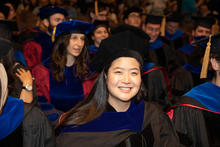Father’s Blood and Mother’s Love: Illegitimate Children in the Japanese Empire, 1868–1945
Jooyeon Hahm - Postdoctoral Associate in East Asian Studies and Lecturer in History
Lunch will be served.
Japan’s 1882 Criminal Code stopped recognizing concubines as family members, but the household registration (koseki) continued to record children born to concubines under fathers’ registries until 1942. During this time, Japanese family law divided offspring into three groups: (1) legitimate children (chakushi) born to married couples, (2) children by concubines (shoshi) listed on fathers’ registries, and (3) illegitimate children (shiseishi) without paternal recognition listed on maternal family registries. This trifold categorization, as opposed to a legitimate-illegitimate binary in the West, distinguishes Japanese family law in the early twentieth century.
This talk examines the evolution of legal and social discourse on illegitimate children in the Japanese empire. First, it demonstrates how Japan imported the concept of illegitimacy from the West and amended this concept to guarantee the rights of the child. The second part uses statistical analysis to gauge changes in social perception of out-of-wedlock birth in Japan and the colonies after the implementation of the trifold categorization. Finally, by analyzing court cases involving illegitimate children, this talk debunks the myth of paternity suits as onerous for unwed mothers, and further demonstrates how the Japanese empire pioneered improvements in legal status for illegitimate children.
Jooyeon Hahm is a historian of modern East Asia, with a particular interest in gender and legal history. Jooyeon earned her Ph.D. in History from University of Pennsylvania in 2019. Her dissertation, “Family Matters: Concubines and Illegitimate Children in the Japanese Empire, 1868–1945,” traces the history of family law in the Japanese empire as a process whereby those on the margins challenged norms and altered the hegemonic discourse on family. Contrary to popular perceptions of Japanese family law as patriarchal, she identified a progressive turn that promoted intimacy-based family life in court cases involving concubines and illegitimate children in Japan, Taiwan, and Korea.
During her time at Yale, she will prepare her dissertation for publication. She will also teach a class on the relationship between law and gender in the early twentieth-century Japanese empire in Fall 2019.

